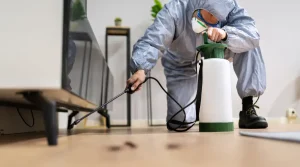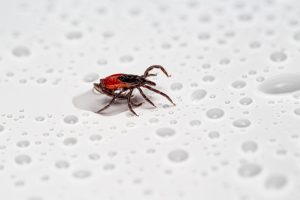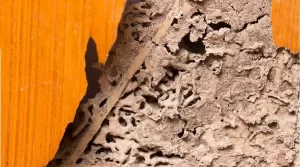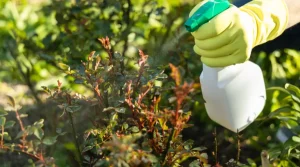In California, where environmental preservation is a priority, eco-friendly pest control methods provide a sustainable solution that protects human health and the planet. By moving away from harmful chemicals, these practices align with eco-conscious values.
Key Takeaways
- Eco-friendly pest control emphasizes natural and non-toxic solutions, avoiding harmful chemicals that damage human health and the environment.
- Integrated Pest Management (IPM) is a leading method, focusing on a balanced approach with beneficial insects and environmentally conscious practices.
- Eco-friendly methods offer long-term cost savings, improved air quality, and reduced chemical exposure.
- The shift towards natural pest control methods supports healthier ecosystems, soil health, and wildlife protection.
Why Eco-Friendly Pest Control Matters
Striving for a harmonious coexistence with nature is not just a passing trend but a critical goal. Traditional pest control methods often rely on chemicals that not only kill pests but also have the potential to harm human health, pets, and the environment. These substances have the ability to permeate the soil and water supply, polluting ecosystems and causing long-term damage.
Fortunately, eco-friendly pest control methods present an alternative that preserves environmental integrity while effectively addressing pest problems. These approaches are rooted in natural solutions and sustainable practices that work in tandem with the environment rather than against it. As California’s eco-conscious population continues to grow, it is clear that the demand for eco-friendly pest management will only increase. Adopting these techniques from residential areas to agricultural landscapes ensures a healthier future for both people and wildlife.
Which Pest Management Technique is Most Eco-Friendly?
Integrated Pest Management (IPM) is a holistic and responsible approach using various eco-friendly techniques. IPM integrates multiple pest control strategies, using a combination of natural predators, environmental modifications, and the cultivation of pest-resistant plants. This strategy reduces dependency on chemical pesticides, allowing nature to manage pest populations in a balanced and sustainable manner.
Introducing helpful insects like ladybugs, for instance and predatory mites, can help control harmful pests like aphids and spider mites. Additionally, planting pest-resistant crops and making minor environmental adjustments, such as improving drainage and reducing standing water, can discourage pests from thriving. This approach eliminates pests and promotes biodiversity and ecological balance, making it an ideal solution for eco-conscious households.
The Top 12 Advantages of Eco-Friendly Pest Control
- Preservation of the Environment
Eco-friendly pest control methods focus on maintaining the natural balance by avoiding toxic chemicals that can harm habitats, wildlife, and vegetation. This approach helps protect biodiversity and preserve the ecosystems that sustain life.
- Enhanced Household Safety
By using natural, non-toxic alternatives, eco-friendly pest control ensures a safer environment for families and pets. Traditional pesticides often pose risks of allergies, respiratory problems, and even long-term health effects. Eco-friendly solutions eliminate these hazards, creating a healthier home environment.
- Embrace Sustainable Practices
Eco-friendly pest control techniques promote sustainable practices by offering long-term solutions. Unlike short-term chemical treatments, these methods focus on prevention, reducing the need for continual reapplication of harmful chemicals.
- Cost Efficiency
While eco-friendly pest control might have Despite requiring a larger initial expenditure, it ends up being more economical over time. Preventing recurring pest problems reduces the need for costly repairs, replacements, and repeated pesticide applications.
- Precision Targeting
Methods like IPM allow for precise pest management. This ensures that harmful pests are targeted while preserving beneficial insects, such as pollinators, vital to maintaining healthy ecosystems.
- Air Quality Improvement
By reducing chemical pesticides, eco-friendly methods contribute to improved air quality. This is particularly crucial in cities where air pollution may exacerbate respiratory issues in humans, pets, and wildlife.
- Wildlife Protection
Traditional pest control can harm wildlife, mainly when pesticides spread through soil and water. Eco-friendly methods help protect local wildlife, including pollinators, birds, and other animals that rely on chemical-free environments.
- Reduced Chemical Exposure
Eco-friendly pest control minimizes humans and the environment’s exposure to harmful chemicals. Reducing chemical exposure lowers the risk of pesticide-related health issues, such as cancer, congenital disabilities, and neurological damage.
- Community Care
Choosing eco-friendly pest control methods is a commitment to community health. These methods reduce pollution and create a safer, more sustainable environment for everyone in the neighborhood.
- Soil Health Promotion
Many chemical pesticides damage the soil, affecting its fertility and structure. Eco-friendly pest control supports soil health using organic solutions that nurture the soil and enhance its ability to support healthy plant growth.
- Support for Local Ecology
Eco-friendly methods help bolster local ecology by supporting biodiversity. Natural repellents and biological controls can protect local flora and fauna, strengthening local ecosystems and improving their resilience.
- Adherence to Regulations
Eco-friendly pest control techniques are compliant with increasingly stringent environmental regulations. These methods help prevent potential legal issues from harmful chemicals, ensuring that pest management practices are legal and practical.
Exploring Natural and Environmentally Sound Approaches
The growing interest in eco-friendly pest control methods is particularly evident in California’s urban and rural landscapes. Integrated Pest Management (IPM) is widely adopted in agriculture, leveraging natural predators and crop rotation to maintain pest populations. The state’s commitment to sustainability and conservation has also led to increased use of natural repellents such as neem oil, garlic, and peppermint, which offer effective pest control without environmental harm.
The shift towards organic farming is another reflection of this commitment to sustainability. Organic farmers prioritize soil health and biodiversity over chemical pesticides, aligning their practices with the state’s eco-conscious ethos. This trend also influences residential pest control, with homeowners opting for non-toxic and natural alternatives to chemical-laden pesticides.
FAQ
Q: What is Integrated Pest Management (IPM)?
A: IPM is an eco-friendly approach to pest control that manages pest populations by using a combination of natural predators, environmental adjustments, and the cultivation of pest-resistant plants. It reduces reliance on chemical pesticides and promotes long-term ecological balance.
Q: Are eco-friendly pest control methods effective?
A: Yes! Eco-friendly methods, such as IPM and natural repellents, effectively manage pests while preserving the environment. These techniques focus on prevention, precision, and non-toxic alternatives that target pests without harming beneficial organisms.
Q: Are eco-friendly pest control methods more expensive than traditional ones?
A: While eco-friendly pest control methods may have higher initial costs, they are more cost-effective in the long run. They prevent recurring pest issues and reduce the need for expensive pesticide treatments or repairs caused by pest damage.
Q: How do natural repellents work?
A: Natural repellents, like neem oil, garlic, and peppermint, use the strong scents or chemical compounds found in plants to repel pests. These repellents disrupt pests’ feeding and breeding behaviors, providing a safe, non-toxic alternative to chemical pesticides.
Q: Can I use eco-friendly pest control in my garden?
A: Absolutely! Eco-friendly pest control methods are perfect for gardens. You can use beneficial insects and plant pest-resistant species and apply natural repellents help repel pests without damaging the environment or your plants.
Conclusion
Eco-friendly pest control is not just a responsible choice but essential for preserving the planet’s well-being. Whether you live in an urban area or a rural farm, these methods offer practical, sustainable, and effective solutions for managing pest populations. We can safeguard our health and the environment by embracing Integrated Poway Pest Control Management, utilizing natural repellents, and supporting organic practices. In California, where eco-conscious living is a core value, the demand for eco-friendly pest control will continue to rise, shaping a future prioritizing sustainability, biodiversity, and responsible stewardship of nature.






